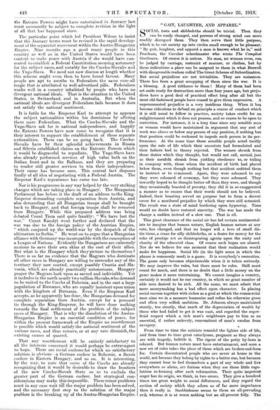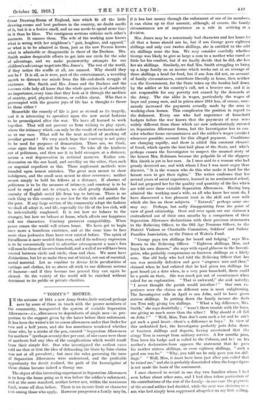" GAIT, LAUGHTER, AND APPAREL."
SOCIAL tests and shibboleths should be triviaL Then they can be easily changed, and persons of strong mind can more readily disregard them. They then serve their little purpose, which is to cut society up into circles small enough to be pleasant. " By gait, laughter, and apparel a man is known what he is," said Peaeham, the Cavalier schoolmaster who wrote The Compleat Gentleman. Of course it is untrue. No man, no woman even, can be judged by carriage, restraint of manner, or clothes, but by these indications a place can be assigned to them in what Boswell with disagreeable realism called The Great Scheme of Subordination. But social prejudices are not trivialities. They are nuisances. There has been a great scrapping of them since the war. It is a blessing. A good riddance to them ! Many of them had been set aside ready for destruction more than four years ago, but preju. dices have a good deal of practical effect long after all but the most old-fashioned people have ceased to give them expression. A superannuated prejudice is a very insidious thing. When it has become ridiculous to defend on principle a course of conduct which it is still usual to follow in practice, society takes credit for an enlightenment which it does not possess, and so ceases to be open to correction. For instance, it is a long time since any sensible man or woman would have maintained in argument that any sort of work was above or below any person of any position, if nothing but that position could be reckoned to impede such person in its per- formance. At the same time those sensible people acted tacitly upon the rule of life which their ancestors had formulated and their fathers had in theory rejected. The women shrank from those duties which they thought, but would not call, menial, just as their menfolk shrank from yielding obedience to, or toiling in company with, those whom the accident of birth had placed below them, even though nothing but that accident unfitted them to instruct or to command. Again, they were ashamed to say they were ashamed of economy, but they were ashamed. They inwardly hoped to be thought better off than they were, and though they occasionally boasted of poverty, they did it in so exaggerated a manner as to ensure that their words should not be believed. Indeed, their boasting served no purpose but to form a decent cover for a moribund prejudice by which they were still actuated. The result was a state of mind bordering upon hypocrisy. Time would no doubt have restored sincerity. The war has made the change a sudden instead of a slow one. That is alL
This great clearance of the social air has led certain sentimental- ists to imagine that human nature, English human nature at any rate, has changed, and that no longer will a love of small dis- tinctions, a craze for silly shibboleths, or a desire for money for the sake of prestige act as disintegrating agents upon the unity and charity of the educated class. Of course such hopes are absurd. Nor do we believe for one moment that their realization would make for happiness. Social life (in the light sense in which the phrase is commonly used) is a game. It is everybody's recreation. The game only becomes objectionable when it is taken seriously. We may improve the rules, but there must be rules. Skill must count for much, and there is no doubt that a little money on the game makes it more entertaining. We cannot imagine a country, certainly it would not be our country, in which no great number of able men desired to be rich. All the same, we must admit that mere moneymaking has a bad effect upon character. In placing social success together with riches as a goal at which the commercial man aims we in a measure humanize and refine his otherwise gross and of ten very selfish ambition. Dr. Johnson always maintained stoutly, too stoutly, that much of the depreciation of wealth by those who had failed to get it was cant, and regarded the super- ficial respect which a rich man's neighbours pay to him as an essential, if rather unlovely, concomitant of man's exodus from savagery.
From time to time the satirists remodel the lighter side of life, and from time to time great cataclysms, pregnant as they always are with tragedy, belittle it. The rigour of the petty by-laws is relaxed. But human nature must have entertainment, and soon a new set of rules takes the place of those which are broken and done for. Certain discontented people who are never at home in the world, not because they belong by rights to a better one, but because they cannot bear to feel themselves a part of any whole and live everywhere as aliens, are furious when they see these little regu- lations re-forming after each reformation. Their quite impotent anger has its origin, we think, in two errors. They give a hundred times too great weight to social differences, and they regard the section of society which they adorn as of far more importance than it really is. Snobbishness seems to them an all-pervading evil, whereas it is at worst nothing but an all-present folly. The
Great Drawing-Room of England, into which fit all the little drawing-rooms and best parlours in the country, no doubt smells of it, but it is a festive smell, and no one needs to spend more time in it than he likes. The -contiguous sections criticize each other's manners. It amuses them. The wife of the working man knows what is wrong with her neighbour's " gait, laughter, and apparel," or what is to be admired in themi just as the new Peeress knows what is admirable or disagreeable in those of the Duchess. Mrs. Smith makes despicable efforts to get into our circle for the sake of advantage, and we make praiseworthy attempts for our children's advantage to get into Mrs. Jones's. The rest of the world, if they notice the scuffle at all, are amused. Why should they not be ? It is all, as it were, part of the entertainment, a wrestling match to distract our minds from the life-and-death struggle of existence. Mrs. Smith and Mrs. Jones and the Duchess and the nouveau riche lady all know that the whole question is of absolutely no importance, every time that they look at it through the medium of anxiety, grief, physical distress, or sudden alarm. Who that is preoccupied with the greater joys of life has a thought to throw to them either ?
Meanwhile the comedy of life is just as eternal as its tragedy, and it is interesting to speculate upon the new social fashions to be promulgated after the war. We have all learned to work together. That will not prevent us from wishing to play apart, where the intimacy which can only bo the result of exclusion makes us at our ease. What will be the next method of marking off peculiar ground ? We very much hope that courtesy is not going to be used for purposes of demarcation. There are, we think, some signs that this will be the case. To take all the kindness out of politeness, and then use it to hold strangers at a distance; means a real degeneration in national manners. Rather con- descension on the one hand, and servility on the other, than such an ungenial expedient as this. These unpleasant methods were founded upon honest mistaken. The great man meant to show indulgence, and the small man meant to show reverence; neither meant simply to hold his fellows at a distance. If absence of politeness is to be the measure of intimacy, and courtesy is to be used to repel and not to attract, we shall greatly diminish the amenity of English social life from top to bottom. There is no such thing in this country as one law for the rich and another for the poor. If any large section of the community adopt the fashion we shall all adopt it, and life, especially the life of the less rich, will be indescribably roughened. It is not how we behave to the stranger, but how we behave at home, which affects our happiness and our characters. Courtesy preserves compatibility. When peace comes the world will return home. We have got to begin once more a humdrum existence, and at the same time to face more class jealousies than have ever existed before. The spirit of friendliness is more needed than ever, and if its ordinary expression is to be ceremonially used to advertise estrangement a man's foes will soon be those of his own household, and a wall of ice will have been erected between circle and circle, class and class. We must have distinctions, but let us make them out of trivial, not out of essential, moral material. Let us combine to devise little peculiarities of carriage and clothes, let us above all stick to our different notions of humour—and if they become too general they can again be altered. So the variety of the world will be enriched without detriment to its public or private charities.



































 Previous page
Previous page